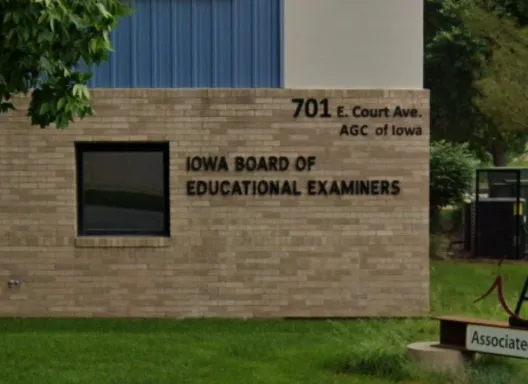On this page...
The Iowa Board of Educational Examiners operates according to Iowa Code 256.145-165 and Iowa Administrative Code 282.
Back to topEmployment Reference Form
Employment Reference Form (160.44 KB) .pdf
Back to topEthics
Iowa Administrative Code 282-25 - Code of Professional Conduct and Ethics
Iowa Administrative Code 282-26 - Code of Rights and Responsibilities
Back to topComplaints
If you are interested in filing a complaint with the Board of Educational Examiners (Board), first check that the person you are interested in filing the complaint against is a licensed practitioner. Use the License Search to look up practitioner licenses.
Basic Requirements
Note: only certain individuals are allowed to file complaints under the laws and rules that govern the Board. These include:
- licensed practitioners employed by a school district, educational entity or recognized local or state professional organization
- parents or guardians of students involved in the alleged complaint
Complaints to the Board must be signed. The Board cannot take action on anonymous complaints.
To warrant investigation by Board staff, complaints must:
- relate to an alleged violation of one or more of the standards of practice in the Code of Professional Conduct and Ethics (Iowa Administrative Code 282-25).
- be of a sufficient magnitude to warrant a hearing by the Board.
- have sufficient, concrete evidence (not just suspicion or conjecture) to support the allegations.
- be filed within three years of the events in question, unless there is good cause for a delay.
Complaint Form
Submit the completed form to BoEE.Complaints@iowa.gov.
Before Filing a Complaint
Potential complainants should first make every effort to resolve issues at a local level. The Board complaint process involves many steps and in some cases it can take months to arrive at a final resolution. While the Board has the power to impose sanctions on a practitioner’s license (such as a public reprimand, suspension, or revocation), it does not have the power to order local school districts to take any particular action. Therefore, working with local administrators and/or school board members can sometimes address a potential complainant’s concerns more quickly and effectively.
Complaint Resolution Process
- If a complaint meets the basic requirements outlined above, it will be assigned to a Board investigator.
- The investigator will gather documents, conduct interviews as needed, and prepare a report for review by the Board.
- The Board will then determine whether there is probable cause to believe there has been a violation of the Code of Professional Conduct and Ethics.
- If probable cause exists, the case will be set for hearing before an administrative law judge.
- Following the hearing, the administrative law judge will draft a proposed decision.
- The Board will then review the proposed decision and make a final determination as to whether there has been an ethical violation and, if so, what sanction is appropriate.
Board Complaint Resolution Process Flowchart (1.14 MB) .pdf
Required Reporting of Ethics Violations Memo (115.55 KB) .pdf
Back to topBoard Decisions
The database of Board decisions that can be searched.
Back to top